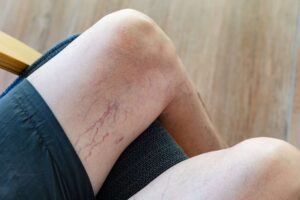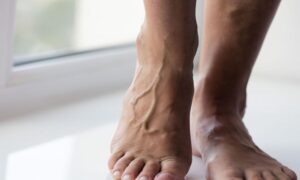| Seeing a vein specialist is essential for accurately diagnosing and effectively treating vein conditions such as varicose veins, spider veins, and chronic venous insufficiency. Miami Vein Institute offers advanced, minimally invasive treatments tailored to each patient’s needs, providing expert care in Coral Gables and Weston, Florida. Schedule a consultation with Miami Vein Institute today to take the first step towards healthier, more comfortable legs. |
The term vein specialist can refer to a medical professional with advanced training and experience in diagnosing and treating conditions related to the venous system. Unlike general practitioners, vein specialists focus specifically on disorders of the veins, such as varicose veins, spider veins, deep vein thrombosis (DVT), and chronic venous insufficiency.
At Miami Vein Institute, located in Coral Gables and Weston, Florida, our team is led by a highly skilled general and cosmetic surgeon who specializes in vein treatments. We offer the latest minimally invasive techniques to help patients achieve healthier, more comfortable legs.
Why Choose a Vein Specialist Over a General Practitioner or Hospital?
Vein specialists have dedicated a considerable amount of time and energy to understanding the complexities of the venous system. They have extensive training in diagnosing vein conditions and are well-versed in the most advanced, minimally invasive treatments.
At a specialized vein practice like Miami Vein Institute, patients have access to the latest technologies and treatments specifically designed for vein care. By contrast, a general practitioner or hospital may not have the same level of expertise or the latest equipment dedicated to vein care.
These include options like sclerotherapy, endovenous laser treatment (EVLT), and radiofrequency ablation, which are less invasive and offer faster recovery times than traditional surgical methods.
A vein specialist provides comprehensive care tailored to each patient’s unique needs. From the initial consultation to post-treatment follow-up, an experienced vein specialist offers a personalized approach that addresses not just the symptoms but also the underlying causes of vein conditions.
Who Might Need to See a Vein Specialist?
Recognizing when to see a vein specialist is crucial for preventing potential complications and ensuring effective treatment. Early detection and intervention can make a significant difference in managing vein conditions, reducing the risk of progression and improving outcomes.
By addressing vein issues at the onset, a specialist can provide targeted treatment that not only alleviates symptoms but also prevents further damage, leading to healthier legs and a better quality of life.
Here are a few conditions that may warrant the expertise of a vein specialist:
- Varicose Veins: Enlarged, twisted veins that often cause pain, swelling, and discomfort.
- Spider Veins: Smaller, red or blue veins that appear close to the surface of the skin, often causing cosmetic concerns.
- Deep Vein Thrombosis (DVT): A serious condition where blood clots form in the deep veins, typically in the legs, which can lead to life-threatening complications if not treated.
- Chronic Venous Insufficiency: A condition where the veins have trouble sending blood from the legs back to the heart, leading to swelling, pain, and skin changes.
If you experience any of the following symptoms, it may be time to consult a vein specialist:
- Leg pain or aching: Persistent discomfort in the legs, especially after standing or sitting for long periods.
- Swelling: Unexplained swelling in the legs or ankles.
- Visible veins: Noticeable varicose or spider veins that are becoming more prominent or causing discomfort.
- Skin changes: Darkening of the skin, especially around the ankles, or the development of sores that do not heal.
Treatment Options Offered at Miami Vein Institute
At Miami Vein Institute, we offer a range of advanced, minimally invasive treatments to address various vein conditions. Here’s an overview of the treatments available, how they work, and their benefits.
Sclerotherapy
Sclerotherapy is a procedure that involves injecting a special solution directly into the affected veins. This solution causes the veins to collapse and eventually be absorbed by the body, improving circulation and reducing the appearance of varicose and spider veins.
The sclerosing agent irritates the lining of the vein, leading to its closure and rerouting of blood flow through healthier veins. Over time, the treated veins fade from view.
- Effective for treating both varicose veins and spider veins.
- Minimally invasive with no downtime, allowing you to return to normal activities quickly.
- Proven track record of safety and effectiveness with noticeable results in just a few weeks.
Endovenous Laser Treatment (EVLT)
EVLT is a minimally invasive procedure that uses laser energy to close off large varicose veins. This treatment is particularly effective for deeper veins that cannot be treated with surface methods.
A thin laser fiber is inserted into the vein, and laser energy is applied to the vein wall. The heat causes the vein to collapse and seal shut, which is then gradually absorbed by the body, rerouting blood to healthier veins.
- Highly effective for large varicose veins, offering long-term relief.
- Quick procedure with minimal discomfort and a short recovery period.
- Provides a significant improvement in both the appearance and symptoms of varicose veins.
Radiofrequency Ablation (RFA)
RFA is a minimally invasive treatment that uses radiofrequency energy to heat and close off varicose veins. It is a safe and effective option for patients with symptomatic varicose veins.
A catheter is inserted into the vein, and radiofrequency energy is delivered to heat the vein wall, causing it to shrink and close off. The closed vein is then reabsorbed by the body, and blood is redirected to healthier veins.
- Effective in treating large, symptomatic varicose veins.
- Minimally invasive with a short recovery time, allowing for a quick return to daily activities.
- Provides long-lasting results with a high success rate.
These treatment options at Miami Vein Institute are designed to provide effective relief from vein conditions while minimizing discomfort and downtime. Our team is dedicated to creating personalized treatment plans that meet your specific needs, ensuring the best possible outcomes for your vein health.
What Are The Benefits of Seeing a Vein Specialist?
Accurate Diagnosis
Getting an accurate diagnosis is crucial for effective treatment. Vein specialists use advanced diagnostic tools, such as ultrasound, to precisely identify vein issues and determine the best course of action. This ensures that the treatment targets the root cause of the problem, leading to more effective and lasting results.
Customized Treatment Plans
At Miami Vein Institute, every patient receives a customized treatment plan based on their specific condition and goals. Whether you need sclerotherapy for spider veins or EVLT for larger varicose veins, our team tailors the treatment to ensure the best possible outcome. This personalized approach not only improves the effectiveness of the treatment but also minimizes the risk of complications.
Better Outcomes
Specialized care from a vein expert often leads to better outcomes compared to general treatment options. Vein specialists are equipped to handle even the most complex cases, ensuring that you receive the highest standard of care. This results in more effective treatments, quicker recoveries, and a higher likelihood of long-term success.
Aftercare Tips Following Vein Treatment
Compression Therapy
After undergoing vein treatment, wearing compression stockings is often recommended to support recovery and enhance circulation. These stockings help prevent blood from pooling in the veins and reduce the risk of complications, such as swelling or clot formation.
Activity Guidelines
Staying active is important after vein treatment, but it’s crucial to follow your specialist’s guidelines. Walking is typically encouraged to promote circulation, but you should avoid prolonged periods of sitting or standing, as well as any strenuous activities that could strain the treated area.
Skin Care
Proper skin care is essential after vein treatment. Keeping the treated area clean and moisturized can help prevent irritation and promote healing. Additionally, protecting the skin from sun exposure by using sunscreen or wearing protective clothing is important to prevent pigmentation changes and ensure optimal results.
Choose Miami Vein Institute for Expert Vein Care in Coral Gables
When it comes to treating vein conditions, seeing a specialist makes all the difference. A vein specialist offers the expertise, technology, and personalized care necessary to effectively diagnose and treat venous disorders, leading to better outcomes and a higher quality of life.
At Miami Vein Institute in Coral Gables and Weston, Florida, we are committed to providing our patients with the highest standard of care using the latest minimally invasive treatments. Don’t ignore the signs of vein disease.
Schedule a consultation with the Miami Vein Institute in Coral Gables or Weston, Florida, today and receive expert care from our specialized team for healthier, more comfortable legs.
Frequently Asked Questions (FAQ)
1. How do I know if I need to see a vein specialist?
If you’re experiencing symptoms such as leg pain, swelling, visible veins, or skin changes, it’s a good idea to consult a vein specialist. Additionally, if you have a family history of vein problems or have been diagnosed with a condition like varicose veins or DVT, a specialist can provide the expert care you need.
2. What should I expect during my first visit to a vein specialist?
During your initial consultation at Miami Vein Institute, the specialist will take a detailed medical history, perform a physical examination, and may order diagnostic tests, such as an ultrasound, to assess your vein health. Based on the findings, a personalized treatment plan will be discussed.
3. Is vein treatment covered by insurance?
Many vein treatments are covered by insurance, especially if they are deemed medically necessary. It’s important to check with your insurance provider to understand your coverage, and the team at Miami Vein Institute can assist you in navigating the insurance process.
4. How long is the recovery period after vein treatment?
Recovery times vary depending on the type of treatment, but most minimally invasive procedures, such as sclerotherapy or EVLT, have short recovery periods. Patients can often return to normal activities within a few days, with full recovery taking a few weeks.

John W. Dr. Chang, MD, serves as the Partner and Medical Director at Miami Vein Institute, a premier center specializing in vein treatment in South Florida. With a focus on providing high-quality care and ensuring patient safety and satisfaction, Dr. Chang has helped establish Miami Vein Institute as a leading destination for minimally invasive vein treatments. At Miami Vein Institute, Dr. Chang offers a comprehensive range of minimally invasive procedures, including Endovenous Laser Treatments (EVLT) and Sclerotherapy, to address various vein-related concerns. His expertise in both general and cosmetic surgery, combined with specialized training in vein treatments, allows him to tailor treatment plans to meet each patient’s individual needs. Dr. Chang’s commitment to excellence is reflected in his meticulous attention to detail and dedication to staying updated with the latest advancements in vein care technologies. He is certified in a wide array of cosmetic surgery procedures and is a certified trainer for various advanced techniques. Dr. Chang’s affiliations with prestigious medical associations underscore his commitment to upholding the highest standards of medical excellence. With a focus on patient well-being and personalized care, Dr. Chang ensures that every patient receives honest, expert guidance throughout their treatment journey. His passion for providing the best possible care is evident in his commitment to patient satisfaction and achieving optimal outcomes.


